
second-brain-ai-assistant-course
Learn to build your Second Brain AI assistant with LLMs, agents, RAG, fine-tuning, LLMOps and AI systems techniques.
Stars: 539

This open-source course teaches how to build an advanced RAG and LLM system using LLMOps and ML systems best practices. It helps you create an AI assistant that leverages your personal knowledge base to answer questions, summarize documents, and provide insights. The course covers topics such as LLM system architecture, pipeline orchestration, large-scale web crawling, model fine-tuning, and advanced RAG features. It is suitable for ML/AI engineers and data/software engineers & data scientists looking to level up to production AI systems. The course is free, with minimal costs for tools like OpenAI's API and Hugging Face's Dedicated Endpoints. Participants will build two separate Python applications for offline ML pipelines and online inference pipeline.
README:
This course is part of Decoding ML's open-source series, teaching you how to build production-ready GenAI systems using LLMs, RAG, agents and LLMOps.
The Second Brain AI Assistant course contains 6 modules that will teach you how to build an advanced RAG and LLM system using LLMOps and ML systems best practices. You'll learn to build an end-to-end AI assistant that chats with your Second Brain - your personal knowledge base of notes, resources, and storage.
By the end of this course, you'll be able to architect and implement a production-ready agentic RAG and LLM system from scratch.
The Second Brain, a concept by Tiago Forte, is your personal knowledge base of notes, ideas, and resources. Our AI Assistant leverages this knowledge to answer questions, summarize documents, and provide insights.
Imagine asking your AI Assistant to recommend agent courses, list top PDF parsing tools, or summarize LLM optimization methods - all based on your research, without manually searching through notes.
While we use Notion for this course, the code is adaptable to other sources like Google Drive or Calendar. We'll provide our curated AI/ML resource list from Notion, covering GenAI, LLMs, RAG, MLOps, and more. No Notion account needed - but if you want to use yours, our flexible pipeline supports any Notion database.

|

|
- Build an agentic RAG system powered by your Second Brain
- Design production-ready LLM architectures
- Apply LLMOps and software engineering best practices
- Fine-tune and deploy LLMs
- Use industry tools: OpenAI, Hugging Face, MongoDB, ZenML, Opik, Comet, Unsloth, and more
After completing this course, you'll have access to your own Second Brain AI assistant, as seen in the video below:

|
Join Decoding ML for proven content on production-grade AI, GenAI, and information retrieval systems. Every week, straight to your inbox. |
While building the Second Brain AI assistant, you'll master:
- LLM system architecture (FTI) and MLOps best practices
- Pipeline orchestration and tracking with ZenML
- LLMOps and RAG evaluation using Opik
- Large-scale web crawling and content normalization
- Quality scoring with LLMs and heuristics
- Dataset generation through distillation
- Llama model fine-tuning with Unsloth and Comet
- Serverless model deployment to Hugging Face
- Advanced RAG with contextual or parent retrieval and vector search
- Agent building using smolagents
- Modern Python tooling (uv, ruff)
🥷 With these skills, you'll become a ninja in building advanced agentic RAG and LLM systems using LLMOps and ML systems best practices.

|

|
People interested in learning how to design and build LLM/RAG applications and systems.
This course is tailored for people who learn by building. After completing the course, you will have your own code template and enough inspiration to develop your personal GenAI applications.
| Target Audience | Why Join? |
|---|---|
| ML/AI Engineers | Build production-ready agentic RAG & LLM systems (beyond Notebook tutorials). |
| Data/Software Engineers | Architect end-to-end agentic RAG and LLM applications. |
| Data Scientists | Implement production AI systems using LLMOps and SWE best practices. |
| Category | Requirements |
|---|---|
| Skills | - Python (Intermediate) - Machine Learning, LLMs, RAG (Beginner) |
| Hardware | Modern laptop/PC (GPU optional - cloud alternatives provided) |
| Level | Intermediate (But with a little sweat and patience, anyone can do it) |
The course is open-source and free! You'll only need $1-$5 for tools if you run the code:
| Service | Maximum Cost |
|---|---|
| OpenAI's API | ~$3 |
| Hugging Face's Dedicated Endpoints (Optional) | ~$2 |
The best part? We offer multiple paths - you can complete the entire course for just ~$1 by choosing cost-efficient options. Reading-only? Everything's free!
As an open-source course, you don't have to enroll. Everything is self-paced, free of charge and with its resources freely accessible at:
- code: this GitHub repository
- lessons: Decoding ML
This open-source course consists of 6 comprehensive modules covering theory, system design, and hands-on implementation.
Our recommendation for getting the most out of this course:
- Clone the repository.
- Read the materials.
- Setup the code and run it to replicate our results.
- Go deeper into the code to understand the details of the implementation.
| Module | Materials | Description | Running the code |
|---|---|---|---|
| 1 | Build your Second Brain AI assistant | Architect an AI assistant for your Second Brain. | No code |
| 2 | Data pipelines for AI assistants | Build a data ETL pipeline to process custom Notion data, crawl documents, compute a quality score using LLMs & heuristics, and ingest them into a document database. | apps/second-brain-offline |
| 3 | From noisy docs to fine-tuning datasets | Use the Notion and crawled data to generate a high-quality summarization instruct dataset using distillation. | apps/second-brain-offline |
| 4 | Playbook to fine-tune and deploy LLMs | Fine-tune an open-source LLM (Llama 3.1 8B) to specialize in summarizing documents. Deploy it as a real-time API endpoint. | apps/second-brain-offline |
| 5 | Build RAG pipelines that actually work | Implement a modular RAG feature pipeline using advanced techniques such as context and parent retrieval. | apps/second-brain-offline |
| 6 | LLMOps for production agentic RAG | Implement the RAG agentic inference pipeline and an observation pipeline to monitor and evaluate the performance of the AI assistant. | apps/second-brain-online |

|
Join Decoding ML for proven content on production-grade AI, GenAI, and information retrieval systems. Every week, straight to your inbox. |
While building the Second Brain AI assistant, we will build two separate Python applications:
.
├── apps /
| ├── infrastructure/ # Docker infrastructure for the applications
| ├── second-brain-offline/ # Offline ML pipelines
└─ └── second-brain-online/ # Online inference pipeline = our AI assistantWe will use our personal list of filtered resources (which we keep in Notion) on AI and ML, such as GenAI, LLMs, RAG, MLOps, LLMOps and information retrieval, containing ~100 pages and 500+ links which we will crawl and access from the Second Brain AI assistant.
For ease of use, we stored a snapshot of our Notion data in a public S3 bucket, which you can download for free without AWS credentials.
Thus, you don't need to use Notion or give access to your Notion to complete this course. But if you want to, you can, as we expose in this GitHub repository, a flexible pipeline that can load any Notion database.
Find detailed setup instructions in each app's documentation:
| Application | Documentation |
|---|---|
| Offline ML Pipelines (data pipelines, RAG, fine-tuning, etc.) | apps/second-brain-offline |
| Online Inference Pipeline (Second Brain AI assistant) | apps/second-brain-online |
Pro tip: Read the accompanying articles first for a better understanding of the system you'll build.
Have questions or running into issues? We're here to help!
Open a GitHub issue for:
- Questions about the course material
- Technical troubleshooting
- Clarification on concepts
As an open-source course, we may not be able to fix all the bugs that arise.
If you find any bugs and know how to fix them, support future readers by contributing to this course with your bug fix.
You can always contribute by:
- Forking the repository
- Fixing the bug
- Creating a pull request
📍 For more details, see the contributing guide.
We will deeply appreciate your support for the AI community and future readers 🤗
 Paul Iusztin AI/ML Engineer |
 Ernesto Larios AI Engineer |
 Anca Ioana Muscalagiu SWE/ML Engineer |
This project is licensed under the MIT License - see the LICENSE file for details.

|
Join Decoding ML for proven content on production-grade AI, GenAI, and information retrieval systems. Every week, straight to your inbox. |
For Tasks:
Click tags to check more tools for each tasksFor Jobs:
Alternative AI tools for second-brain-ai-assistant-course
Similar Open Source Tools

second-brain-ai-assistant-course
This open-source course teaches how to build an advanced RAG and LLM system using LLMOps and ML systems best practices. It helps you create an AI assistant that leverages your personal knowledge base to answer questions, summarize documents, and provide insights. The course covers topics such as LLM system architecture, pipeline orchestration, large-scale web crawling, model fine-tuning, and advanced RAG features. It is suitable for ML/AI engineers and data/software engineers & data scientists looking to level up to production AI systems. The course is free, with minimal costs for tools like OpenAI's API and Hugging Face's Dedicated Endpoints. Participants will build two separate Python applications for offline ML pipelines and online inference pipeline.
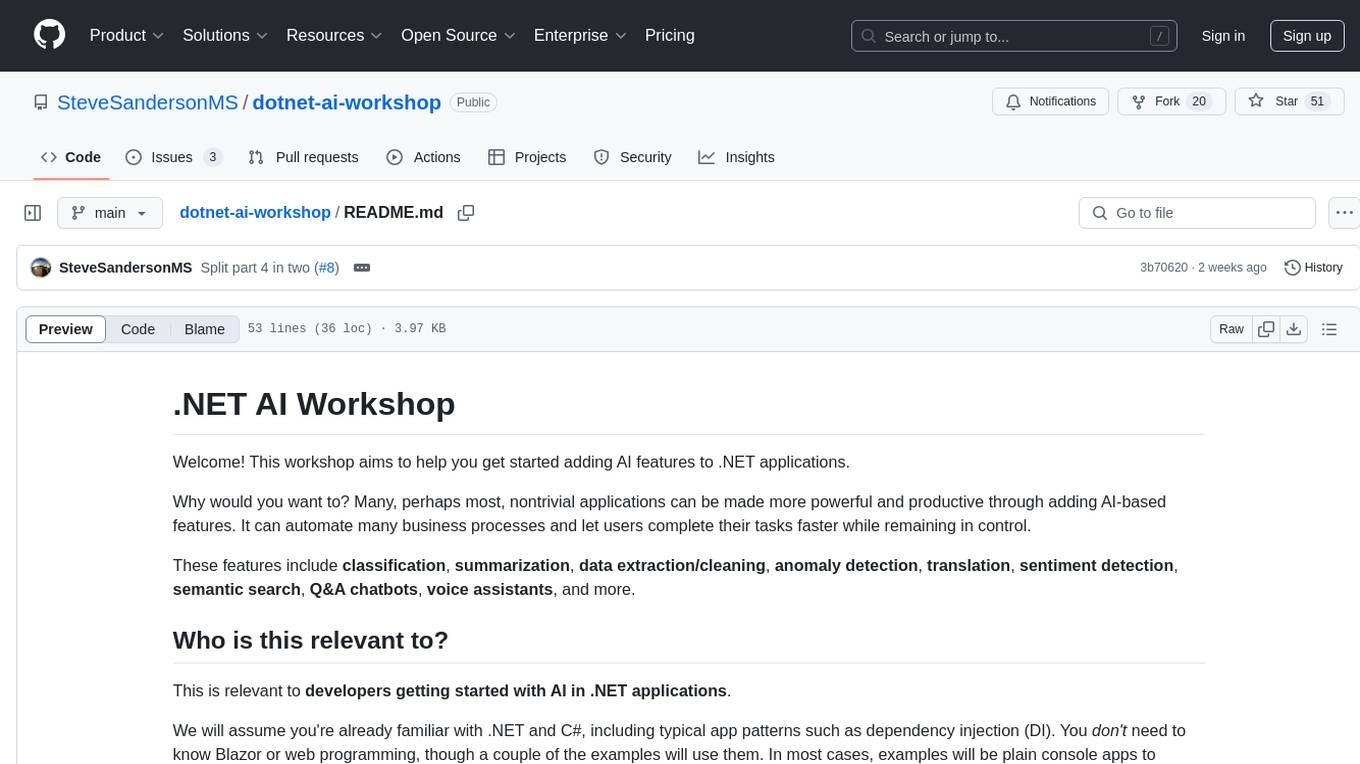
dotnet-ai-workshop
The .NET AI Workshop is a comprehensive guide designed to help developers add AI features to .NET applications. It covers various AI-based features such as classification, summarization, data extraction/cleaning, anomaly detection, translation, sentiment detection, semantic search, Q&A chatbots, and voice assistants. The workshop is tailored for developers new to AI in .NET applications, focusing on the usage of AI services without the need for prior AI technology knowledge. It provides examples using .NET and C# with a focus on AI topics, aiming to enhance productivity and automation in applications.

nexent
Nexent is a powerful tool for analyzing and visualizing network traffic data. It provides comprehensive insights into network behavior, helping users to identify patterns, anomalies, and potential security threats. With its user-friendly interface and advanced features, Nexent is suitable for network administrators, cybersecurity professionals, and anyone looking to gain a deeper understanding of their network infrastructure.

langwatch
LangWatch is a monitoring and analytics platform designed to track, visualize, and analyze interactions with Large Language Models (LLMs). It offers real-time telemetry to optimize LLM cost and latency, a user-friendly interface for deep insights into LLM behavior, user analytics for engagement metrics, detailed debugging capabilities, and guardrails to monitor LLM outputs for issues like PII leaks and toxic language. The platform supports OpenAI and LangChain integrations, simplifying the process of tracing LLM calls and generating API keys for usage. LangWatch also provides documentation for easy integration and self-hosting options for interested users.
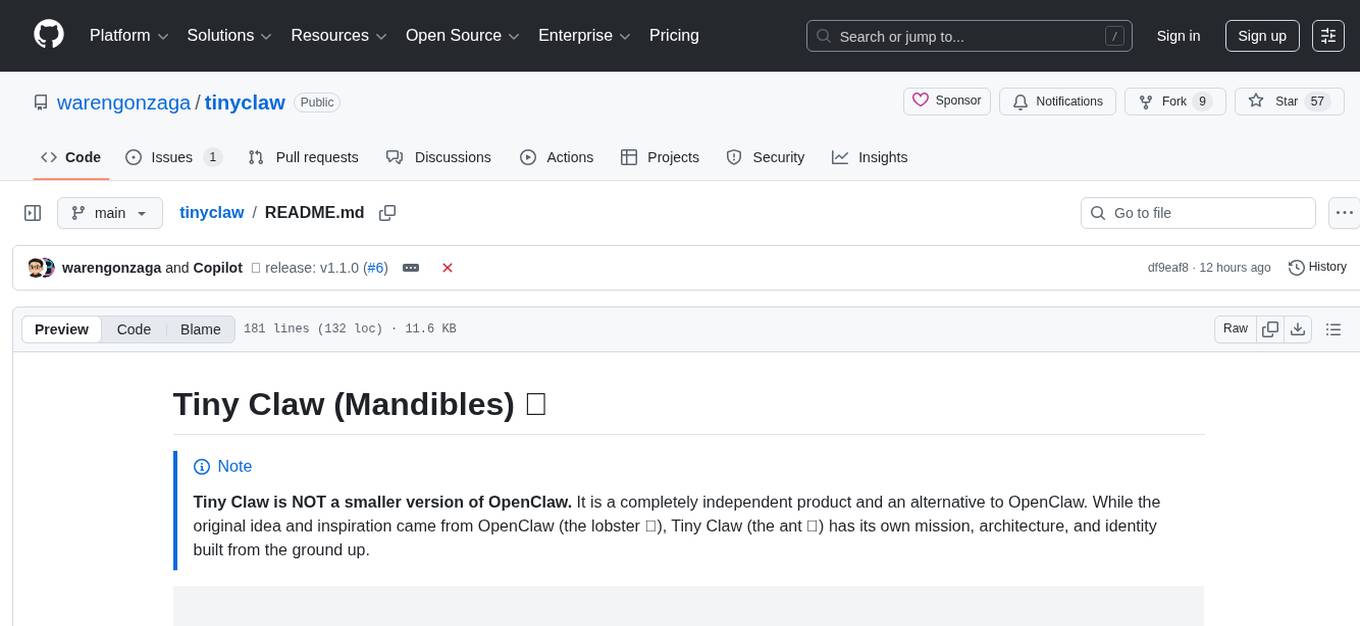
tinyclaw
Tiny Claw (Mandibles) is an autonomous AI companion framework built from scratch with a tiny core, plugin architecture, self-improving memory, and smart routing that tiers queries to cut costs. It aims to make AI simple, affordable, and truly personal, like having your own helpful friend. Inspired by personal AI companions from science fiction, Tiny Claw is designed to assist with work, projects, and daily life, growing with the user over time. The framework features a Discord-like UI, adaptive memory, self-improving behavior, plugin architecture, personality engine, smart routing, context compaction, anti-malware protection, security layers, delegation system, inter-agent communication, easy setup, and multi-provider support.

CodeProject.AI-Server
CodeProject.AI Server is a standalone, self-hosted, fast, free, and open-source Artificial Intelligence microserver designed for any platform and language. It can be installed locally without the need for off-device or out-of-network data transfer, providing an easy-to-use solution for developers interested in AI programming. The server includes a HTTP REST API server, backend analysis services, and the source code, enabling users to perform various AI tasks locally without relying on external services or cloud computing. Current capabilities include object detection, face detection, scene recognition, sentiment analysis, and more, with ongoing feature expansions planned. The project aims to promote AI development, simplify AI implementation, focus on core use-cases, and leverage the expertise of the developer community.
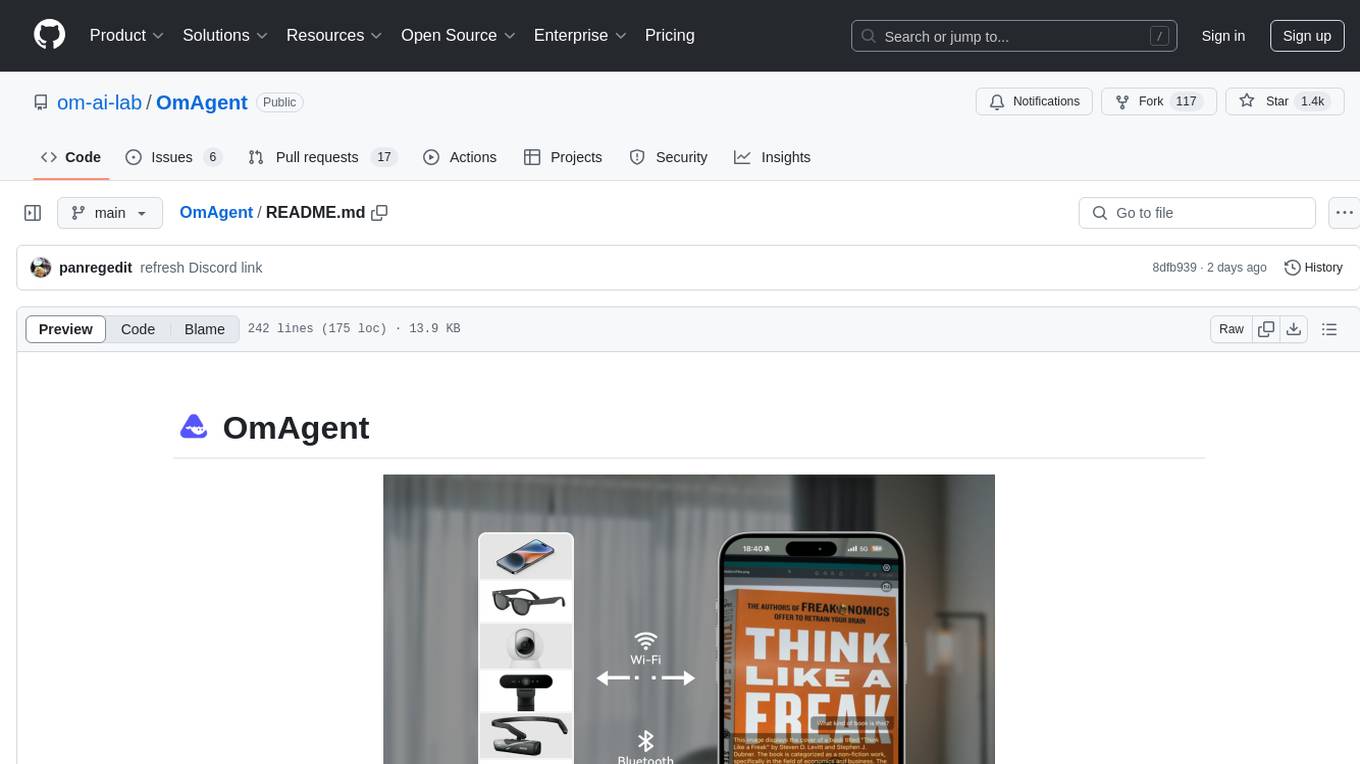
OmAgent
OmAgent is an open-source agent framework designed to streamline the development of on-device multimodal agents. It enables agents to empower various hardware devices, integrates speed-optimized SOTA multimodal models, provides SOTA multimodal agent algorithms, and focuses on optimizing the end-to-end computing pipeline for real-time user interaction experience. Key features include easy connection to diverse devices, scalability, flexibility, and workflow orchestration. The architecture emphasizes graph-based workflow orchestration, native multimodality, and device-centricity, allowing developers to create bespoke intelligent agent programs.
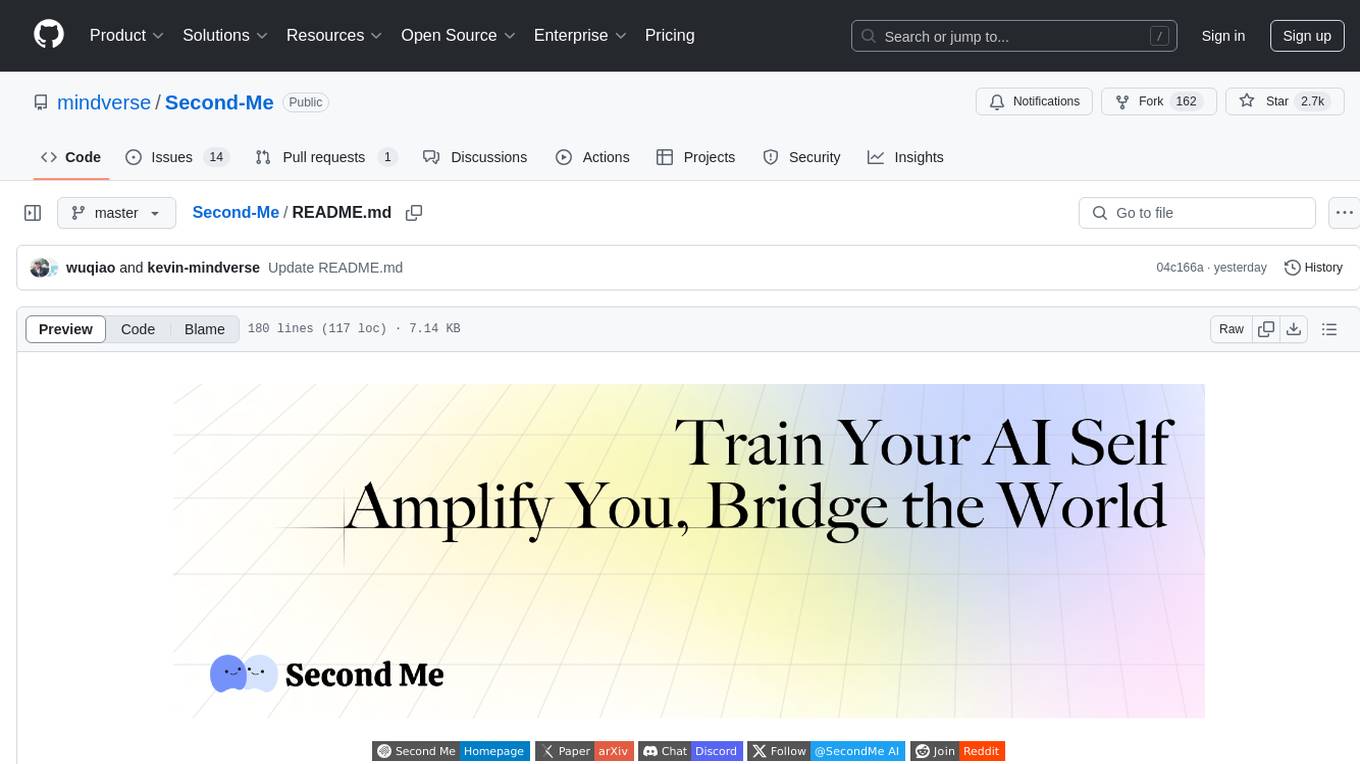
Second-Me
Second Me is an open-source prototype that allows users to craft their own AI self, preserving their identity, context, and interests. It is locally trained and hosted, yet globally connected, scaling intelligence across an AI network. It serves as an AI identity interface, fostering collaboration among AI selves and enabling the development of native AI apps. The tool prioritizes individuality and privacy, ensuring that user information and intelligence remain local and completely private.
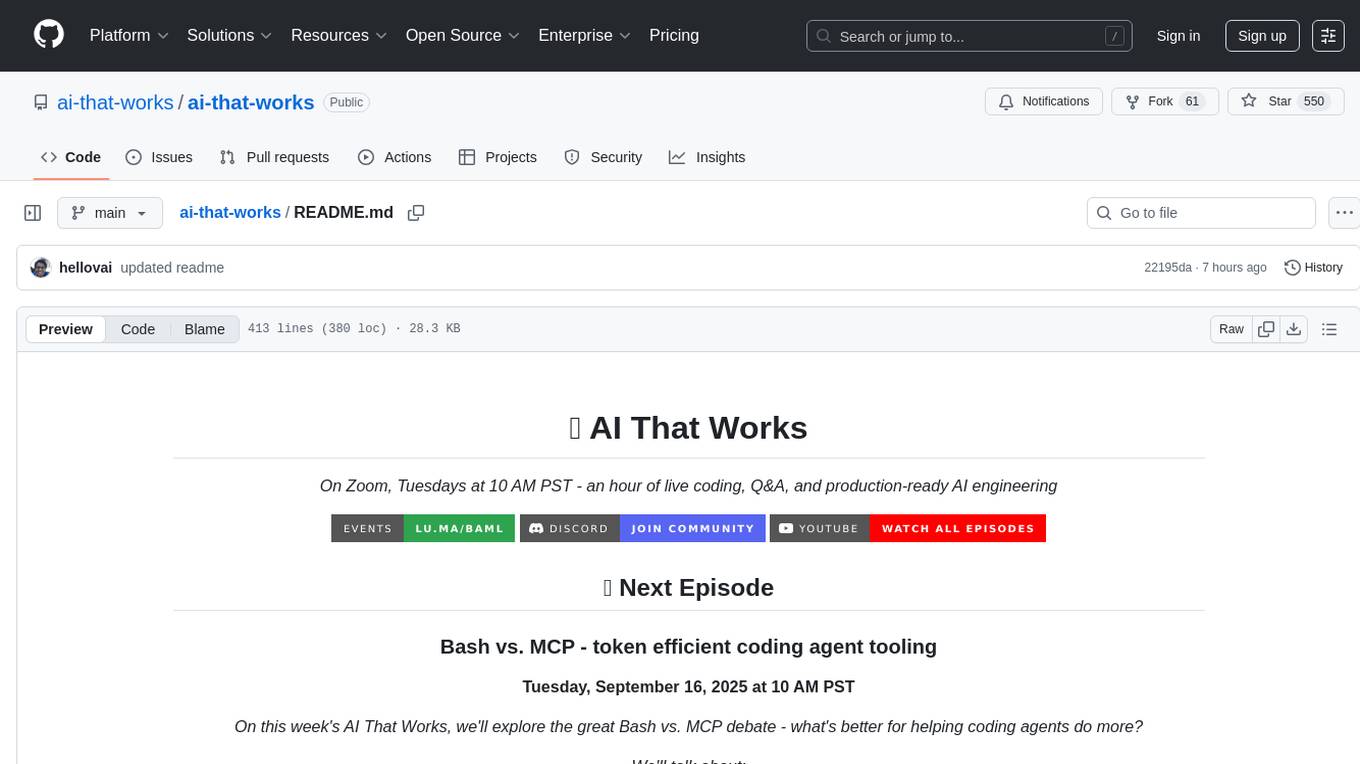
ai-that-works
AI That Works is a weekly live coding event focused on exploring advanced AI engineering techniques and tools to take AI applications from demo to production. The sessions cover topics such as token efficiency, downsides of JSON, writing drop-ins for coding agents, and advanced tricks like .shims for coding tools. The event aims to help participants get the most out of today's AI models and tools through live coding, Q&A sessions, and production-ready insights.
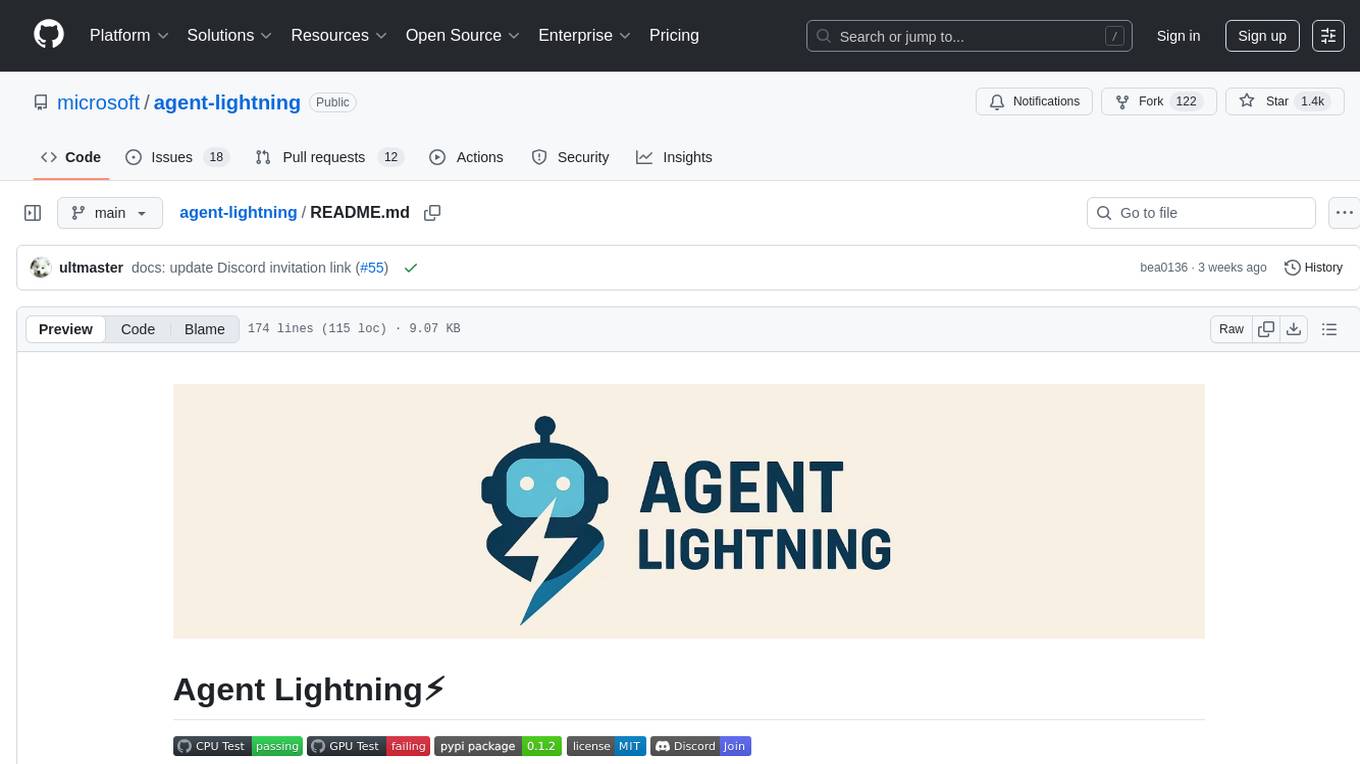
agent-lightning
Agent Lightning is a lightweight and efficient tool for automating repetitive tasks in the field of data analysis and machine learning. It provides a user-friendly interface to create and manage automated workflows, allowing users to easily schedule and execute data processing, model training, and evaluation tasks. With its intuitive design and powerful features, Agent Lightning streamlines the process of building and deploying machine learning models, making it ideal for data scientists, machine learning engineers, and AI enthusiasts looking to boost their productivity and efficiency in their projects.
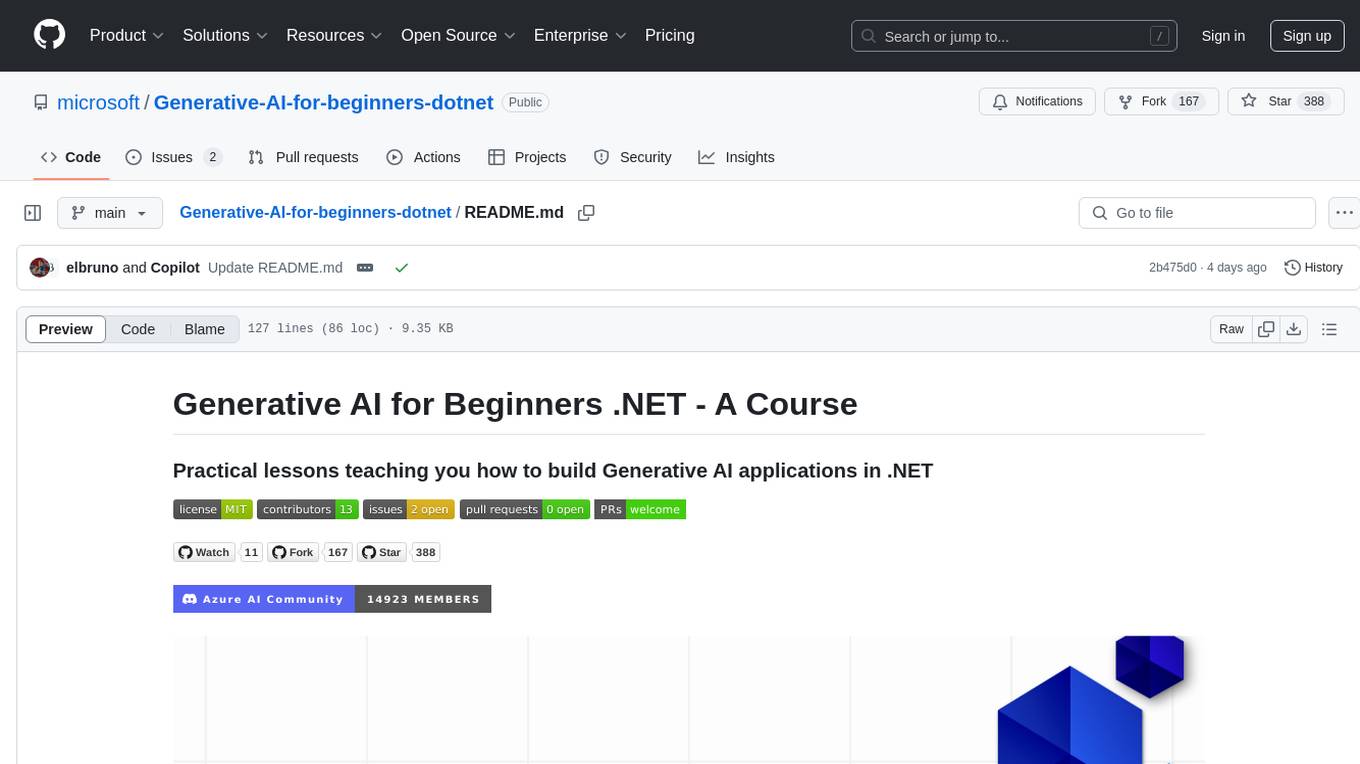
Generative-AI-for-beginners-dotnet
Generative AI for Beginners .NET is a hands-on course designed for .NET developers to learn how to build Generative AI applications. The repository focuses on real-world applications and live coding, providing fully functional code samples and integration with tools like GitHub Codespaces and GitHub Models. Lessons cover topics such as generative models, text generation, multimodal capabilities, and responsible use of Generative AI in .NET apps. The course aims to simplify the journey of implementing Generative AI into .NET projects, offering practical guidance and references for deeper theoretical understanding.
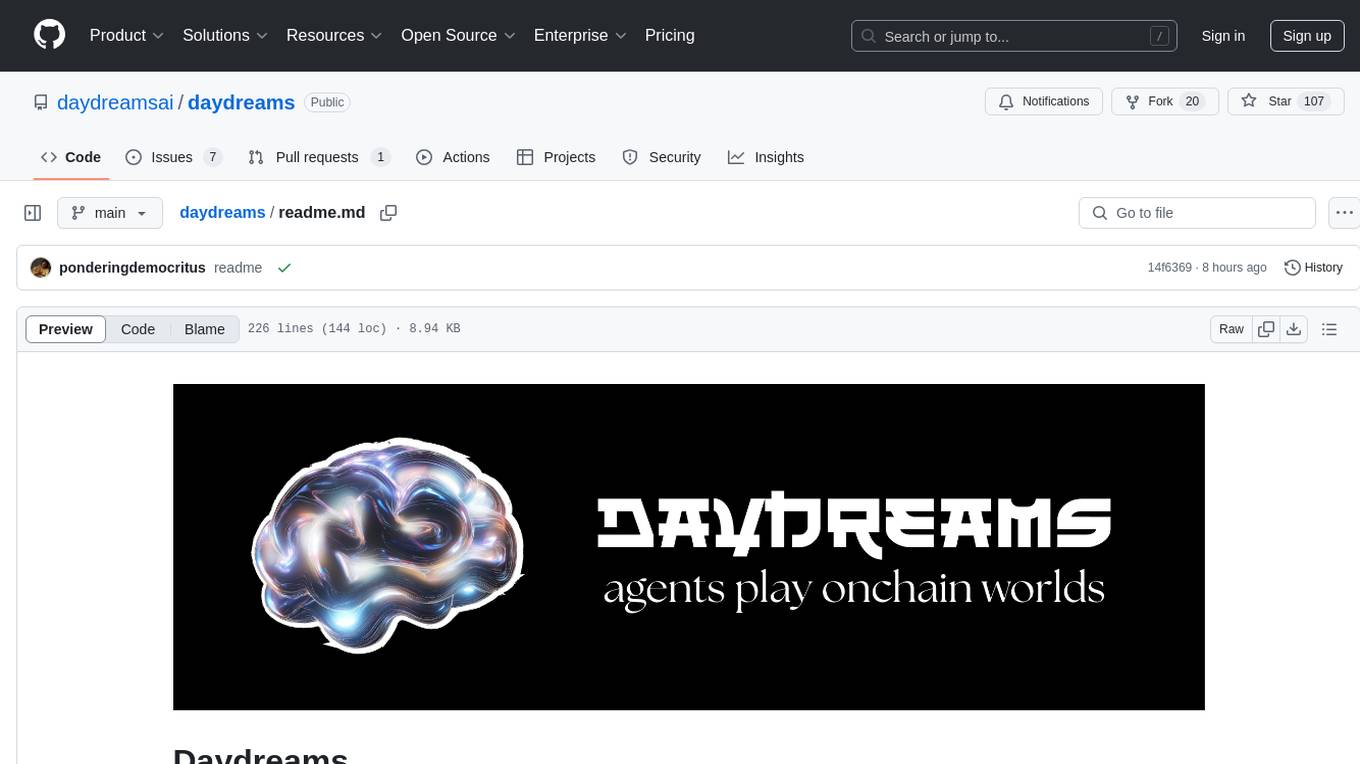
daydreams
Daydreams is a generative agent library designed for playing onchain games by injecting context. It is chain agnostic and allows users to perform onchain tasks, including playing any onchain game. The tool is lightweight and powerful, enabling users to define game context, register actions, set goals, monitor progress, and integrate with external agents. Daydreams aims to be 'lite' and 'composable', dynamically generating code needed to play games. It is currently in pre-alpha stage, seeking feedback and collaboration for further development.
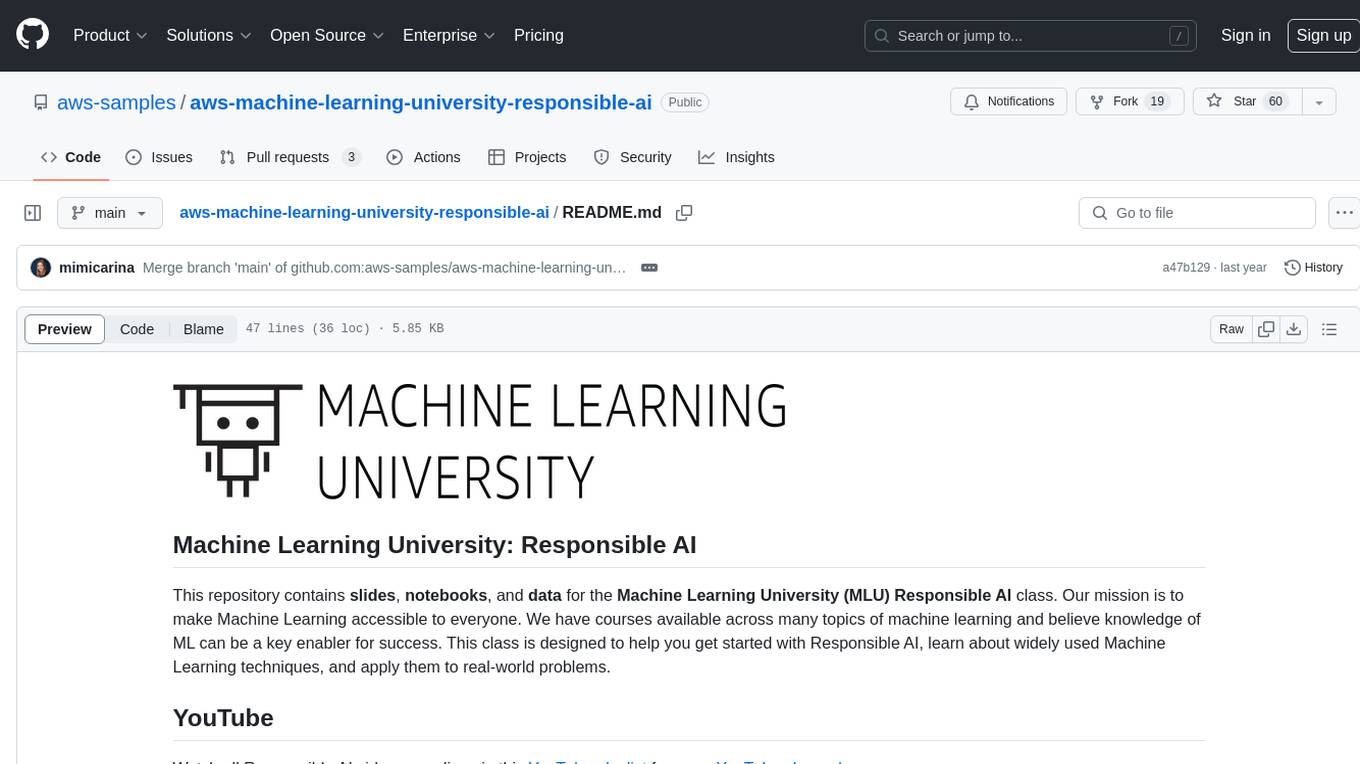
aws-machine-learning-university-responsible-ai
This repository contains slides, notebooks, and data for the Machine Learning University (MLU) Responsible AI class. The mission is to make Machine Learning accessible to everyone, covering widely used ML techniques and applying them to real-world problems. The class includes lectures, final projects, and interactive visuals to help users learn about Responsible AI and core ML concepts.
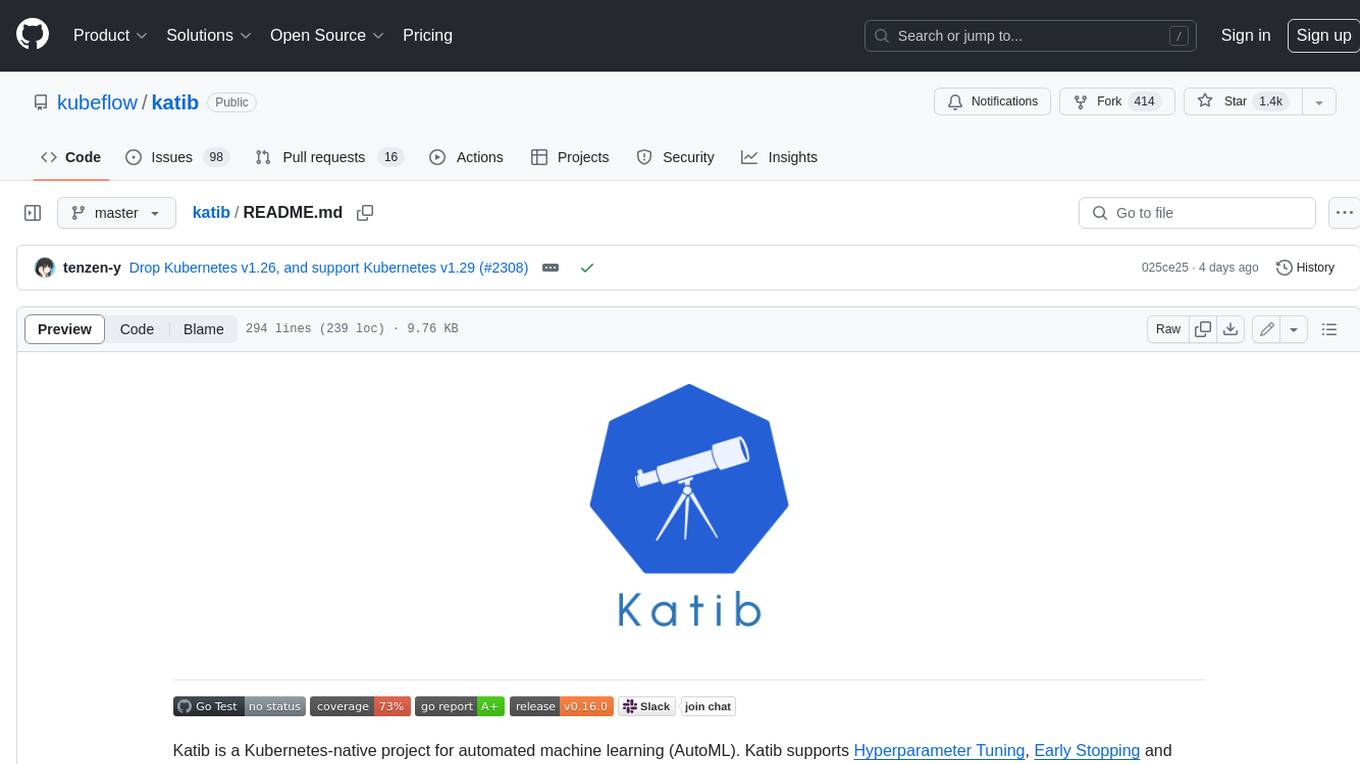
katib
Katib is a Kubernetes-native project for automated machine learning (AutoML). Katib supports Hyperparameter Tuning, Early Stopping and Neural Architecture Search. Katib is the project which is agnostic to machine learning (ML) frameworks. It can tune hyperparameters of applications written in any language of the users’ choice and natively supports many ML frameworks, such as TensorFlow, Apache MXNet, PyTorch, XGBoost, and others. Katib can perform training jobs using any Kubernetes Custom Resources with out of the box support for Kubeflow Training Operator, Argo Workflows, Tekton Pipelines and many more.
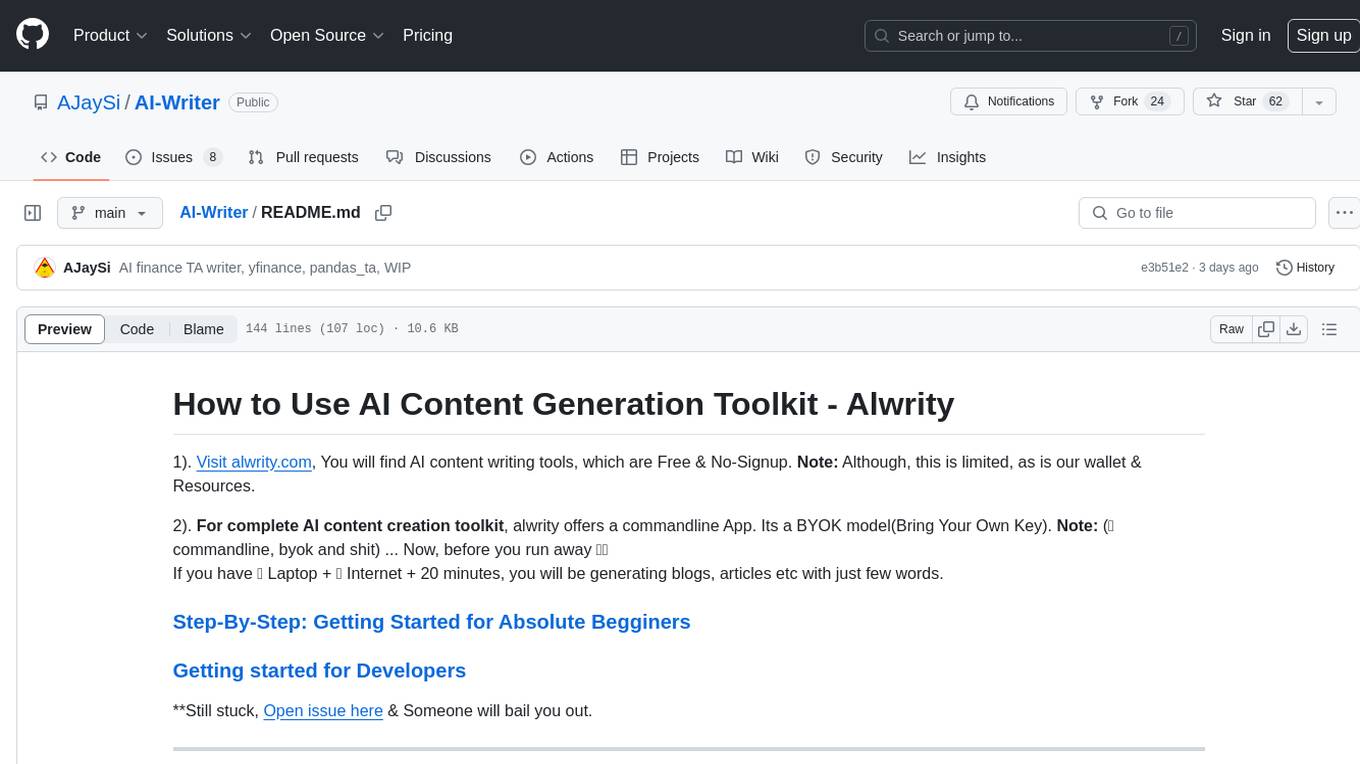
AI-Writer
AI-Writer is an AI content generation toolkit called Alwrity that automates and enhances the process of blog creation, optimization, and management. It integrates advanced AI models for text generation, image creation, and data analysis, offering features such as online research integration, long-form content generation, AI content planning, multilingual support, prevention of AI hallucinations, multimodal content generation, SEO optimization, and integration with platforms like Wordpress and Jekyll. The toolkit is designed for automated blog management and requires appropriate API keys and access credentials for full functionality.
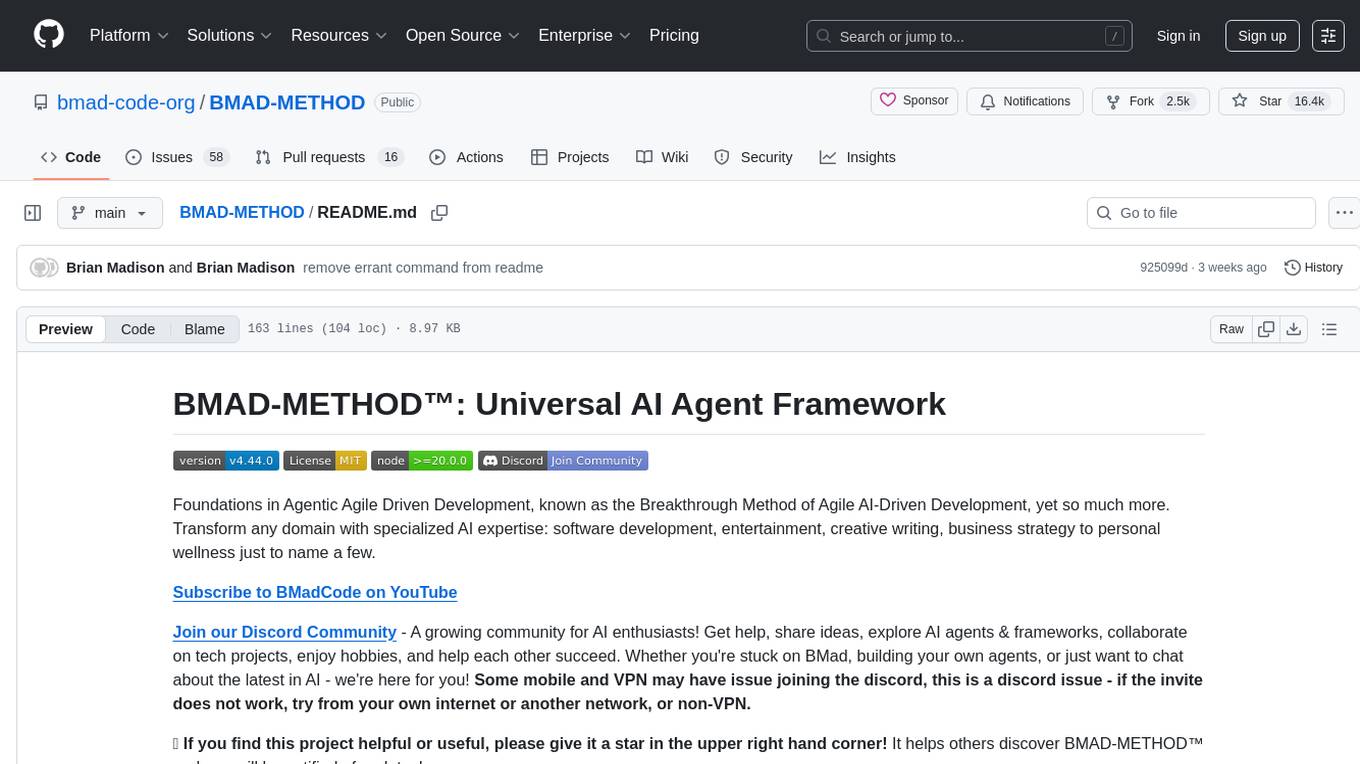
BMAD-METHOD
BMAD-METHOD™ is a universal AI agent framework that revolutionizes Agile AI-Driven Development. It offers specialized AI expertise across various domains, including software development, entertainment, creative writing, business strategy, and personal wellness. The framework introduces two key innovations: Agentic Planning, where dedicated agents collaborate to create detailed specifications, and Context-Engineered Development, which ensures complete understanding and guidance for developers. BMAD-METHOD™ simplifies the development process by eliminating planning inconsistency and context loss, providing a seamless workflow for creating AI agents and expanding functionality through expansion packs.
For similar tasks
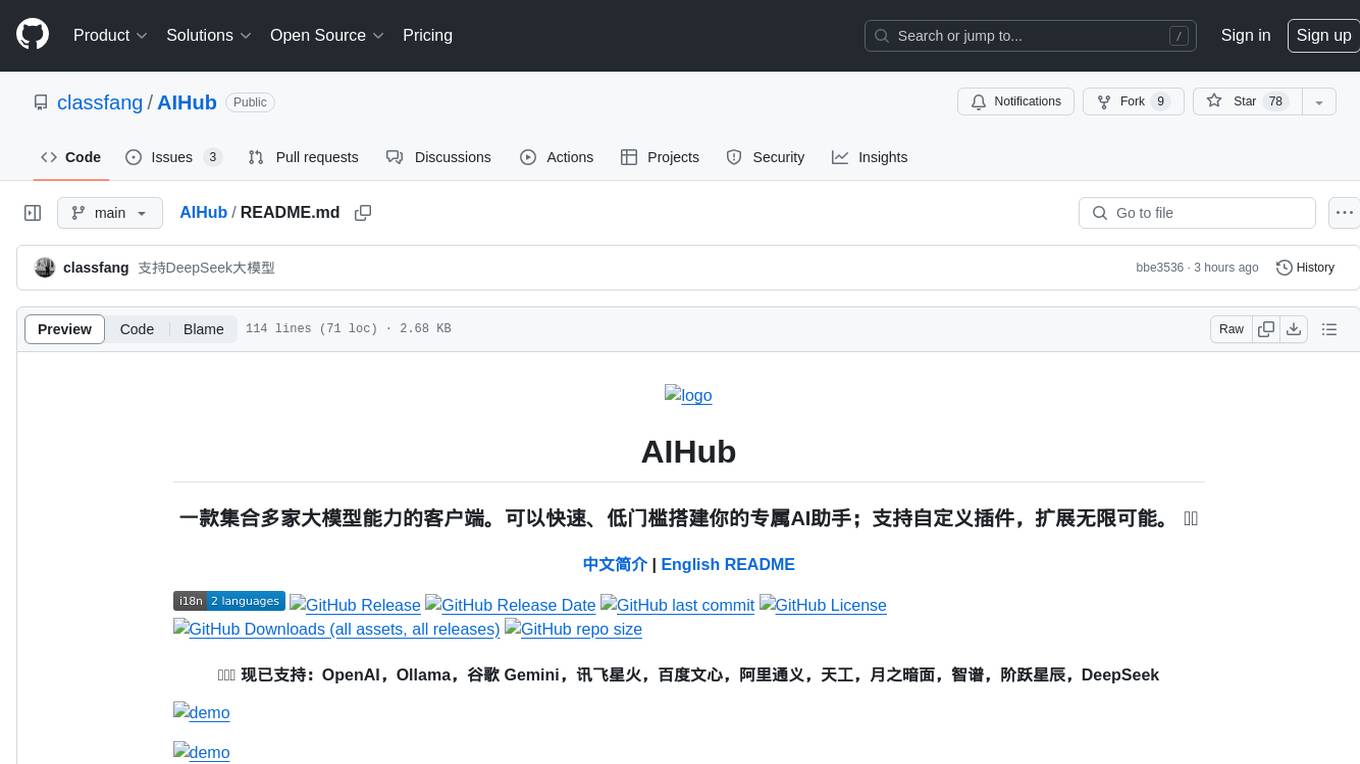
AIHub
AIHub is a client that integrates the capabilities of multiple large models, allowing users to quickly and easily build their own personalized AI assistants. It supports custom plugins for endless possibilities. The tool provides powerful AI capabilities, rich configuration options, customization of AI assistants for text and image conversations, AI drawing, installation of custom plugins, personal knowledge base building, AI calendar generation, support for AI mini programs, and ongoing development of additional features. Users can download the application package from the release section, resolve issues related to macOS app installation, and contribute ideas by submitting issues. The project development involves installation, development, and building processes for different operating systems.
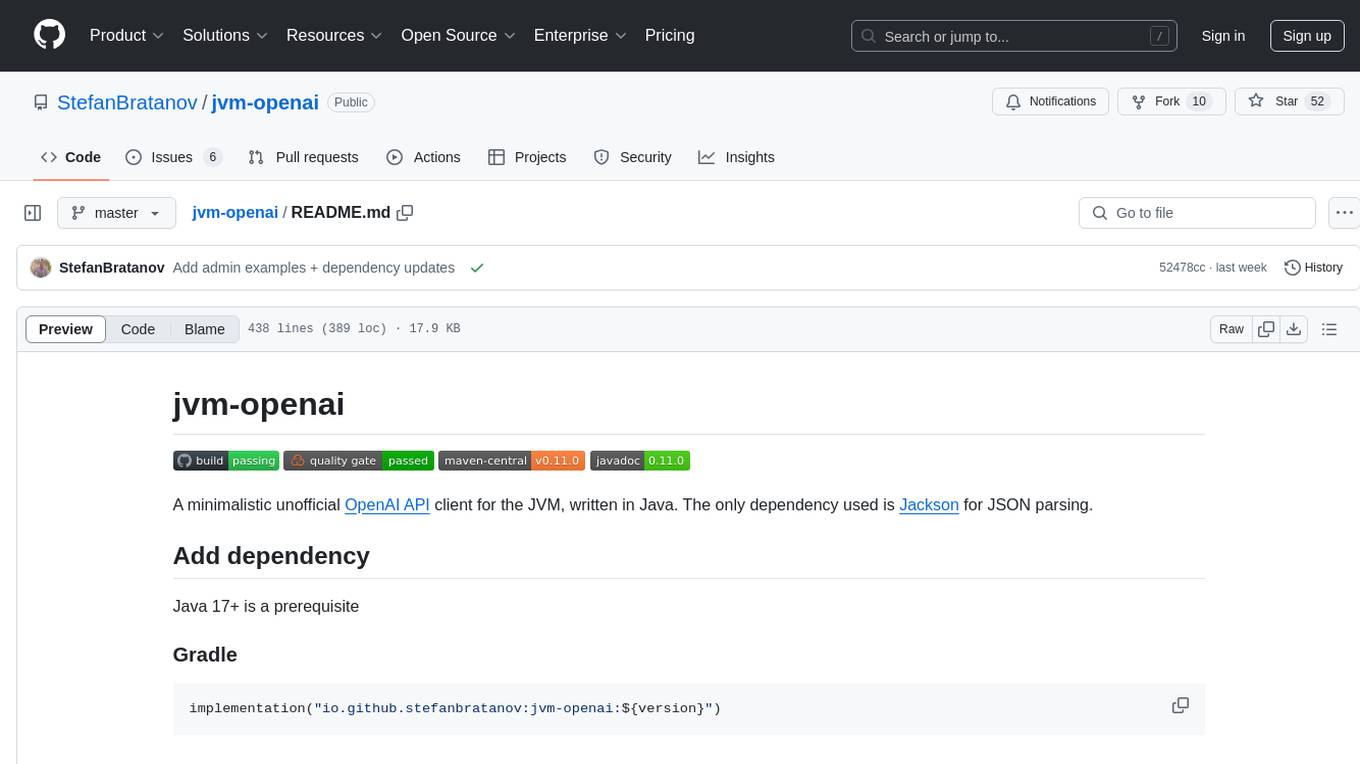
jvm-openai
jvm-openai is a minimalistic unofficial OpenAI API client for the JVM, written in Java. It serves as a Java client for OpenAI API with a focus on simplicity and minimal dependencies. The tool provides support for various OpenAI APIs and endpoints, including Audio, Chat, Embeddings, Fine-tuning, Batch, Files, Uploads, Images, Models, Moderations, Assistants, Threads, Messages, Runs, Run Steps, Vector Stores, Vector Store Files, Vector Store File Batches, Invites, Users, Projects, Project Users, Project Service Accounts, Project API Keys, and Audit Logs. Users can easily integrate this tool into their Java projects to interact with OpenAI services efficiently.

second-brain-ai-assistant-course
This open-source course teaches how to build an advanced RAG and LLM system using LLMOps and ML systems best practices. It helps you create an AI assistant that leverages your personal knowledge base to answer questions, summarize documents, and provide insights. The course covers topics such as LLM system architecture, pipeline orchestration, large-scale web crawling, model fine-tuning, and advanced RAG features. It is suitable for ML/AI engineers and data/software engineers & data scientists looking to level up to production AI systems. The course is free, with minimal costs for tools like OpenAI's API and Hugging Face's Dedicated Endpoints. Participants will build two separate Python applications for offline ML pipelines and online inference pipeline.

ai-on-gke
This repository contains assets related to AI/ML workloads on Google Kubernetes Engine (GKE). Run optimized AI/ML workloads with Google Kubernetes Engine (GKE) platform orchestration capabilities. A robust AI/ML platform considers the following layers: Infrastructure orchestration that support GPUs and TPUs for training and serving workloads at scale Flexible integration with distributed computing and data processing frameworks Support for multiple teams on the same infrastructure to maximize utilization of resources

ray
Ray is a unified framework for scaling AI and Python applications. It consists of a core distributed runtime and a set of AI libraries for simplifying ML compute, including Data, Train, Tune, RLlib, and Serve. Ray runs on any machine, cluster, cloud provider, and Kubernetes, and features a growing ecosystem of community integrations. With Ray, you can seamlessly scale the same code from a laptop to a cluster, making it easy to meet the compute-intensive demands of modern ML workloads.

labelbox-python
Labelbox is a data-centric AI platform for enterprises to develop, optimize, and use AI to solve problems and power new products and services. Enterprises use Labelbox to curate data, generate high-quality human feedback data for computer vision and LLMs, evaluate model performance, and automate tasks by combining AI and human-centric workflows. The academic & research community uses Labelbox for cutting-edge AI research.

djl
Deep Java Library (DJL) is an open-source, high-level, engine-agnostic Java framework for deep learning. It is designed to be easy to get started with and simple to use for Java developers. DJL provides a native Java development experience and allows users to integrate machine learning and deep learning models with their Java applications. The framework is deep learning engine agnostic, enabling users to switch engines at any point for optimal performance. DJL's ergonomic API interface guides users with best practices to accomplish deep learning tasks, such as running inference and training neural networks.

mlflow
MLflow is a platform to streamline machine learning development, including tracking experiments, packaging code into reproducible runs, and sharing and deploying models. MLflow offers a set of lightweight APIs that can be used with any existing machine learning application or library (TensorFlow, PyTorch, XGBoost, etc), wherever you currently run ML code (e.g. in notebooks, standalone applications or the cloud). MLflow's current components are:
* `MLflow Tracking
For similar jobs

second-brain-ai-assistant-course
This open-source course teaches how to build an advanced RAG and LLM system using LLMOps and ML systems best practices. It helps you create an AI assistant that leverages your personal knowledge base to answer questions, summarize documents, and provide insights. The course covers topics such as LLM system architecture, pipeline orchestration, large-scale web crawling, model fine-tuning, and advanced RAG features. It is suitable for ML/AI engineers and data/software engineers & data scientists looking to level up to production AI systems. The course is free, with minimal costs for tools like OpenAI's API and Hugging Face's Dedicated Endpoints. Participants will build two separate Python applications for offline ML pipelines and online inference pipeline.
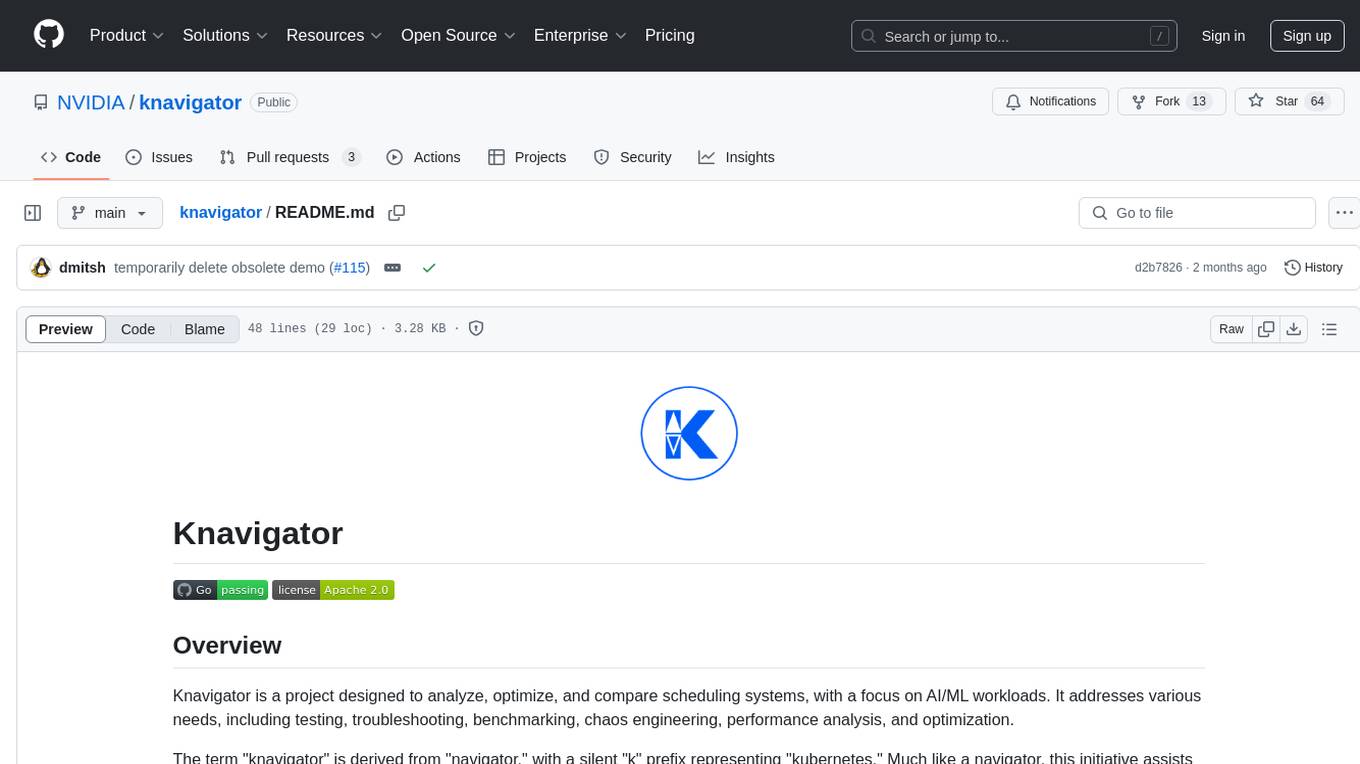
knavigator
Knavigator is a project designed to analyze, optimize, and compare scheduling systems, with a focus on AI/ML workloads. It addresses various needs, including testing, troubleshooting, benchmarking, chaos engineering, performance analysis, and optimization. Knavigator interfaces with Kubernetes clusters to manage tasks such as manipulating with Kubernetes objects, evaluating PromQL queries, as well as executing specific operations. It can operate both outside and inside a Kubernetes cluster, leveraging the Kubernetes API for task management. To facilitate large-scale experiments without the overhead of running actual user workloads, Knavigator utilizes KWOK for creating virtual nodes in extensive clusters.
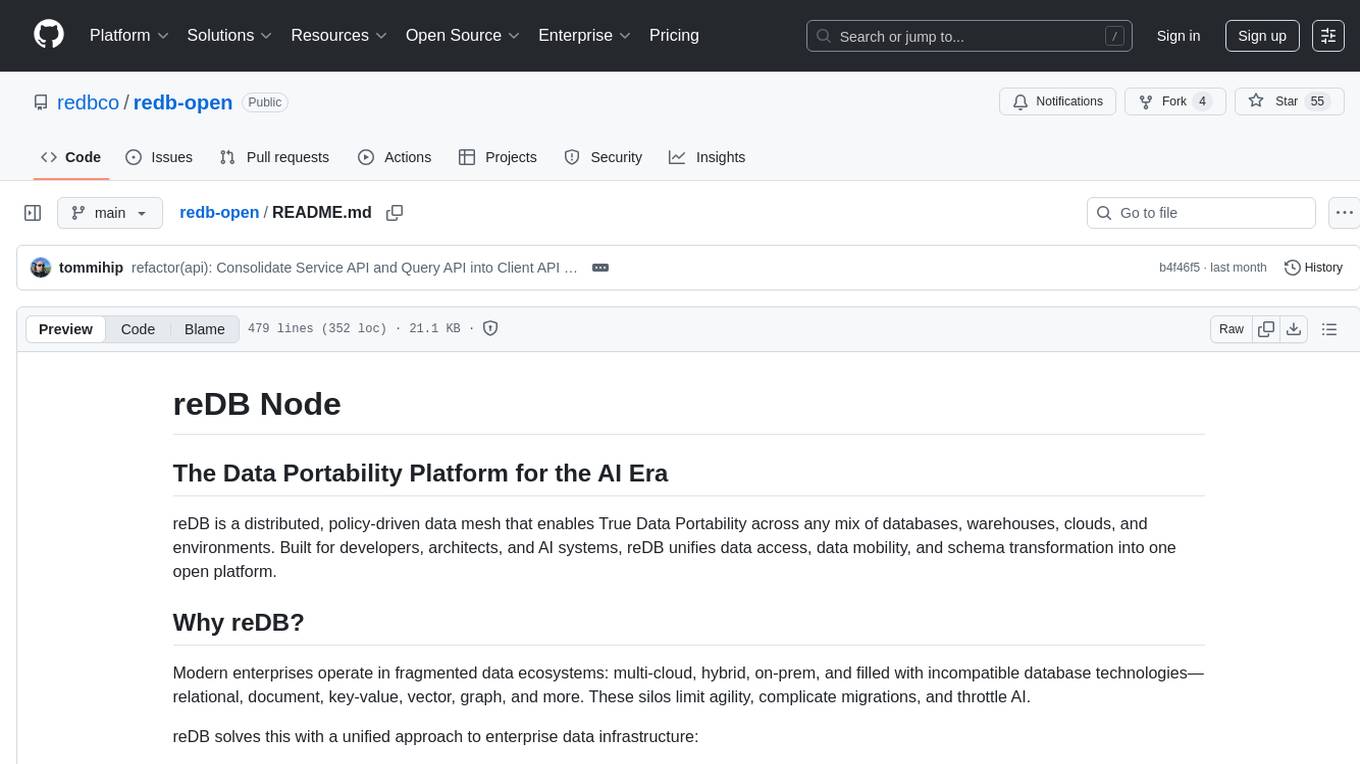
redb-open
reDB Node is a distributed, policy-driven data mesh platform that enables True Data Portability across various databases, warehouses, clouds, and environments. It unifies data access, data mobility, and schema transformation into one open platform. Built for developers, architects, and AI systems, reDB addresses the challenges of fragmented data ecosystems in modern enterprises by providing multi-database interoperability, automated schema versioning, zero-downtime migration, real-time developer data environments with obfuscation, quantum-resistant encryption, and policy-based access control. The project aims to build a foundation for future-proof data infrastructure.

weave
Weave is a toolkit for developing Generative AI applications, built by Weights & Biases. With Weave, you can log and debug language model inputs, outputs, and traces; build rigorous, apples-to-apples evaluations for language model use cases; and organize all the information generated across the LLM workflow, from experimentation to evaluations to production. Weave aims to bring rigor, best-practices, and composability to the inherently experimental process of developing Generative AI software, without introducing cognitive overhead.

agentcloud
AgentCloud is an open-source platform that enables companies to build and deploy private LLM chat apps, empowering teams to securely interact with their data. It comprises three main components: Agent Backend, Webapp, and Vector Proxy. To run this project locally, clone the repository, install Docker, and start the services. The project is licensed under the GNU Affero General Public License, version 3 only. Contributions and feedback are welcome from the community.

oss-fuzz-gen
This framework generates fuzz targets for real-world `C`/`C++` projects with various Large Language Models (LLM) and benchmarks them via the `OSS-Fuzz` platform. It manages to successfully leverage LLMs to generate valid fuzz targets (which generate non-zero coverage increase) for 160 C/C++ projects. The maximum line coverage increase is 29% from the existing human-written targets.

LLMStack
LLMStack is a no-code platform for building generative AI agents, workflows, and chatbots. It allows users to connect their own data, internal tools, and GPT-powered models without any coding experience. LLMStack can be deployed to the cloud or on-premise and can be accessed via HTTP API or triggered from Slack or Discord.

VisionCraft
The VisionCraft API is a free API for using over 100 different AI models. From images to sound.






